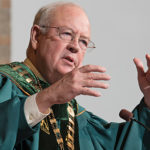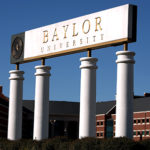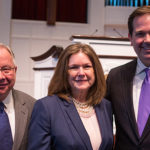Posted: 9/19/03
Brooks leaves Baylor board;
internal auditor disputes charges of conflicts
By Mark Wingfield
Managing Editor
WACO–Houston pastor Duane Brooks resigned from the Baylor University board of regents Sept. 18, citing concerns raised in a newspaper article about a potential conflict of interest.
The Dallas Morning News reported Sept. 7 that Brooks' service on the board violated a policy of the Baptist Geneal Convention of Texas, which elected him to the post. His brother, David Brooks, is Baylor's chief financial officer.
Duane Brooks' resignation came less than a week after an internal Baylor auditor declared that published concerns about conflicts of interest on the Baylor board are “completely baseless and unjustified.”
 |
| Duane Brooks |
The assessment of Juan Alejandro, Baylor's director of internal audit and management, was delivered to reporters Sept. 12, after a news conference at which regents declared their support for embattled President Robert Sloan.
| See Brooks' complete statement here. |
Prior to that meeting, amid calls for Sloan's termination from the Faculty Senate, some regents and some alumni, two media outlets raised questions about the objectivity of the board to make such a decision.
Some board members, the reports suggested, might have conflicts of interest that could color their action.
In addition to the Dallas Morning News, potential conflicts of interest also were discussed in an editorial published on the Baptist website EthicsDaily.com Sept. 9.
The Morning News article, written by staff writer Linda Wertheimer, noted, “Some Sloan critics contend that the deck is stacked in the president's favor because of what they consider conflicts that impair the impartiality of some of the 36 regents.”
The article cited four examples, including Brooks, pastor of Tallowood Baptist Church in Houston; regent Wes Bailey, who owns a Waco insurance company that underwrites Baylor insurance policies; regent Jim Turner, president of the Dr Pepper/Seven Up Bottling Co. in Dallas, which has an exclusive contract with the school; and regent Brian Harbour, pastor of First Baptist Church of Richardson, who teaches adjunctively in Baylor's Truett Seminary.
The EthicsDaily.com editorial mentioned “a number of conflicts of interest on the board,” including those referenced by the Morning News and others. One regent “attends the school's seminary,” author Robert Parham wrote. “Other regents allegedly have adult children on the school payroll. Still others have significant financial interests in the school.”
Parham's editorial criticized a “culture of denial and deception” at Baylor. “The administration's attitude about conflicts of interest is to deny the problem with the deflective reasoning that the regents disclose their conflicts annually and are good people who do the right thing,” he wrote. “If this is the case, the school's leadership deceives itself about how relational and financial pressures can cause morally good people to make morally compromised decisions.”
Three-fourths of the Baylor board is selected by the board itself, and one-fourth is selected by the BGCT.
Baylor spokesman Larry Brumley provided to the Standard a copy of the five-page policy governing conflicts of interest for Baylor regents. It was given with a requirement that the Standard not share it with any other media outlets.
Brumley said the regents are required to disclose annually any conflicts of interest they may have. Those reports are given only to the board, he said, and are held as confidential information.
This practice is spelled out in the regents' policy, which says the annual declarations of conflicts of interest are to be given to the board's audit committee. Disclosures made among the regents are not made public.
The policy provides two “general rules.” The first is that Baylor will seek competitive bids in business transactions.
The second is that the university “shall refrain from entering into any financial, business or other transaction with a regent or a member of his or her immediate family or with any entity or individual in which any such person has a financial interest or management responsibility, inasmuch as such transaction might involve a potential conflict of interest.”
The policy also allows the audit committee to make exceptions to these two rules in cases where the committee believes such a transaction would be in the university's best interest. The policy does not require public disclosure of cases where exceptions are made.
However, the policy warns regents that they “should follow the biblical admonition to avoid even the appearance of impropriety” because “the results of a perceived impropriety may become, over time, more disruptive or damaging than an actual transgression.”
The BGCT policy regarding conflicts of interest and eligibility for service on BGCT-elected boards states: “Trustees must not be related in the third degree by birth, adoption or marriage to each other or to the chief administrators of the institutions on which board they serve.” Chief administrators, the policy says, include the chief executive officer, chief financial officer, chief accounting officer and chief operating officer.
The policy statement adds a definition of third-degree relations, noting exclusion of parents, brothers, sisters, grandparents, nieces, nephews, great-grandchildren.
Duane Brooks said Sept. 18 he was not aware of the BGCT policy until he read the Morning News article. “It is now apparent that my continued service as a Baylor regent would not conform to BGCT guidelines. Although this issue went unnoticed by all concerned for over three years, I recognize that it remains a valid issue.”
Duane Brooks first was elected to the Baylor board by BGCT messengers in November 1999 and began serving on the board June 1, 2000. David Brooks began work as the university's chief financial officer Oct. 1, 2000.
Duane Brooks emphasized that he excused himself from the discussion and vote on his brother's hiring, as well as every subsequent matter the board has approached that relates to his brother. “I am confident that no actual conflicts of interest have occurred,” he said.
The pastor said that when he first learned of his brother's potential hiring, he “immediately offered to step down from the board to remove any possibility of a conflict of interest.”
However, Baylor's “administration and legal counsel” assured him his continued service was “desired and proper,” Brooks said.
“On a number of occasions during my tenure, I have renewed my offer to Baylor to resign as a regent in order to avoid the appearance of impropriety,” he added. “Each time, I was told that my continued participation as a regent was fully acceptable to Baylor and permitted under the bylaws of the Baylor board of regents.”
David Brooks told the Morning News Sept. 7 he thinks critics of Sloan brought attention to his brother's service on the board because they've been unable to remove the president. “This group of dissidents is attacking regents individually. Where was the concern three years ago?” he asked.
Allegations of regents' conflicts of interest are among a variety of issues to be investigated by a newly appointed committee of the regents. It will be chaired by Dale Jones, a retired director and vice president of Halliburton in Dallas. Other members are Bill Brian, an attorney from Amarillo; Bobby Dagnel, pastor of First Baptist Church of Lubbock and a doctor of ministry student in Baylor's Truett Seminary; Sue Getterman of Waco; David Sibley, a former state senator from Waco; and Harold Cunningham, Baylor's retired chief financial officer, who lives in Crawford.
Despite the news accounts and the appointment of the regents' own investigative committee, the university administration insisted in its Sept. 12 news release that no conflicts of interest exist on the board.
“It is not a conflict of interest to care about Baylor, have children or friends at Baylor, make charitable donations or to be involved in community activities that touch the university,” said Alejandro.
He cited several examples:
![]() Regent Joe Coleman has two children who work for Baylor, and he may represent the university in a future lawsuit, Alejandro noted.
Regent Joe Coleman has two children who work for Baylor, and he may represent the university in a future lawsuit, Alejandro noted.
“We looked at the pay records, and Mr. Coleman's children are being paid wages comparable to others in their positions,” he added. On the issue of representing Baylor in the lawsuit, Alejandro said, Coleman will not participate in regents' discussion of it, and he did not participate in the decision to hire the firm.
![]() Regent Turner has a exclusive contract to distribute drinks on campus.
Regent Turner has a exclusive contract to distribute drinks on campus.
“That contract was awarded in August 1997 through a competitive bid process, three years before Mr. Turner came on the Baylor board,” Alejandro said. “Their bid providing revenue to Baylor was several million dollars higher than the other bid. In late 2000, the athletic department recommended an extension of the exclusive vending-rights contract, which was executed in December of that year.”
![]() Regent Bailey is president of a family-run company that has the university's insurance contract. He also teaches adjunctively in the business school.
Regent Bailey is president of a family-run company that has the university's insurance contract. He also teaches adjunctively in the business school.
“Mr. Bailey's insurance agency has served as the university's broker since the late 1960s, well before he came on the board,” Alejandro explained. “Furthermore, the university has historically employed an independent insurance consultant every three to four years to evaluate Baylor's total insurance program–both coverage and pricing–and the work his firm performs on behalf of the university. Regarding the class being taught, he is being paid the same as other similar positions, and Mr. Bailey plans to donate his after-tax income to the endowment.”
Bailey released his own one-page statement, asserting that he is “in compliance” with Baylor's conflict-of-interest policy. Bailey also noted that his father, who is chairman of the insurance company, served on the Baylor board for 18 years. During that time, he not only sold insurance coverage to Baylor, but he was appointed by then-President Herbert Reynolds as the university's adjunct risk manager.
![]() Regent Harbour also teaches adjunctively at Baylor, within Truett Seminary. He has taught there since 1994, the year before he was elected to the board, the news release said. “His salary is consistent with other adjunct faculty at Truett, so there is no conflict of interest.”
Regent Harbour also teaches adjunctively at Baylor, within Truett Seminary. He has taught there since 1994, the year before he was elected to the board, the news release said. “His salary is consistent with other adjunct faculty at Truett, so there is no conflict of interest.”
![]() Even regent Brooks, he wrote, presents “no violation of the university's conflict of interest policy.” However, he added: “We understand that there may be an issue regarding compliance with the (BGCT's) own conflict of interest policy in this case, and the university will be working with the BGCT to resolve that matter.”
Even regent Brooks, he wrote, presents “no violation of the university's conflict of interest policy.” However, he added: “We understand that there may be an issue regarding compliance with the (BGCT's) own conflict of interest policy in this case, and the university will be working with the BGCT to resolve that matter.”
Alejandro's internal audit department, according to the university's organizational chart, reports directly to President Sloan but also carries a dotted-line relationship under the supervision of David Brooks.
Duane Brooks expressed gratitude for the opportunity to have served on the board of his alma mater. He pledged to provide “both support and encouragement” to his brother, whose work for the university he declared more important than his own as a regent.
Brooks said he also hopes to work to bring about healing in the fractured Baylor family. “I have many good friends who have a broad range of opinions on the current work at Baylor,” he noted. “Many in my congregation at Tallowood Baptist Church love Robert Sloan and support his leadership; others express sincere concerns about a wide range of issues. I hope to continue to represent them and others to Dr. Sloan and the Baylor board of regents as a committed member of the broader Baylor family.”














We seek to connect God’s story and God’s people around the world. To learn more about God’s story, click here.
Send comments and feedback to Eric Black, our editor. For comments to be published, please specify “letter to the editor.” Maximum length for publication is 300 words.